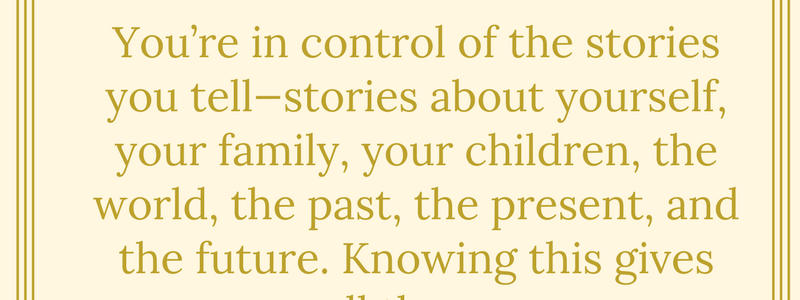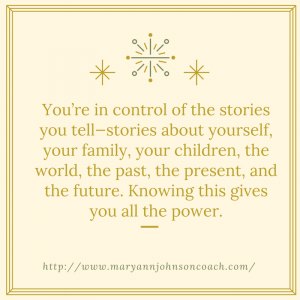Taking care of ourselves when we’re parenting is NOT selfish; it is an investment in our family. When parents care for and nurture themselves they parent better. They are able to remain calm when life is tough, have extended patience and be Present more often.
Last week I mentioned that I do seven simple things that help me care for myself no matter how busy or frustrating the day. This week let’s talk about the NUMBER ONE way to nurture and care for yourself as you parent your family and maintain relationships.
TALK NICELY TO YOURSELF
Think and talk nicely to and about yourself. We would rarely speak to others, even those who are messing up, the way we talk to ourselves. Pay attention to what you say and how you say it. I cannot express the importance of this one step. It will change everything!
It’s magic when it comes to helping you parent well and be Present. As Carol M. Colvin, life coach, stated, “When we say things like ‘I’m such a loser,’ ‘I’m an awful mother or father,’ ‘I’m so fat,’ or ‘I’m just not good enough,’ we do devastating damage to our souls. If we continue to think and speak negatively about ourselves over time, we’ll find that we’ve eroded our self-esteem and extinguished our inner light.”
You need to be your own best friend, no matter how you’re doing presently. Best friends speak kindly to each other and are honest and support one another, even if one of them is floundering. It’s self-care when you treat yourself like your own best friend.
I make it a habit to rephrase any negative words or thoughts immediately. For example—if I say, “I’m so impatient,” I immediately rephrase and say out loud, “I work to be patient and I’m making progress.” It won’t always feel true. Rephrase anyway. The most powerful voice in the world is your own, so rephrase out loud.
 I made myself a “Who I Am” poster. I copied a drawing of a woman from the Internet. I picked a drawing that looked like the kind of woman I felt I wasn’t but wanted to be—perky and cute.
I made myself a “Who I Am” poster. I copied a drawing of a woman from the Internet. I picked a drawing that looked like the kind of woman I felt I wasn’t but wanted to be—perky and cute.
Next, I did some free writing. I wrote all the things I wished I was inside the body of the woman. I wrote exactly what came to my mind without judging the thoughts.
Each day I would stand in front of my poster, strike that perky pose and repeat all of those amazing qualities. It felt so weird at first! After all, it was clear I didn’t currently exhibit many of these qualities, but I was also fully willing to accept that these were my actual strengths in embryo.
I did this little exercise for well over a year. It felt better and better. Those qualities felt truer and truer. But here’s when this little exercise in self-care was the most powerful: When I messed up, I would march myself to my poster and recite all those qualities that were mine, even those in embryo. With tears streaming down my face or anger in my heart or dislike of self coursing through me, I would repeat them loudly and with conviction.
As I repeated the attributes, I accepted that this is who I am despite my weaknesses and my errors in judgment or my occasional poor choices and behavior. By the time I was done reciting, I would feel better. I would be able to do whatever I needed to do to make the situation right. Apologize. Forgive. Pray for a better solution, whatever the need.
I still have that poster in my office where I see it daily. Whether I’m doing well or poorly, I’m reminded of who I am! These are the thoughts that I want to hang on to each day as I work toward becoming the best person I can be. Those attributes are what I replace my negative thoughts with.
There are few things that you can do that will help you care for yourself as powerfully as speaking kindly and with respect to yourself and about yourself, even when, in your mind, you least deserve it.
What strategies do you use to speak more kindly to yourself? What do you do to feel better about yourself when you know you have messed up? Please leave a comment and I will respond. : )
Here’s to more joy,
Mary Ann
P.S. You can learn more about the difference between the 1% principle and the 100% devil in my new book Becoming a Present Parent, Connecting With Your Children in Five Minutes or Less. Knowing the difference will help you let it be enough. You can also receive a chapter from the book on Touchpoints, creating points of connection rather than having points of contention, FREE by visiting becomingapresentparent.com It can be life-changing for your family. I promise!
If you are interested in parenting with a deeper intent why not check out the Home and Family Culture Podcast. I will be sharing information on intentional parenting and you can download a PDF to walk you through the process.



 I keep thinking that I’ll switch topics from the power of controlling our story and response to another parenting topic but every day provides a new and powerful example of just what it looks like to control how we think and act.
I keep thinking that I’ll switch topics from the power of controlling our story and response to another parenting topic but every day provides a new and powerful example of just what it looks like to control how we think and act.